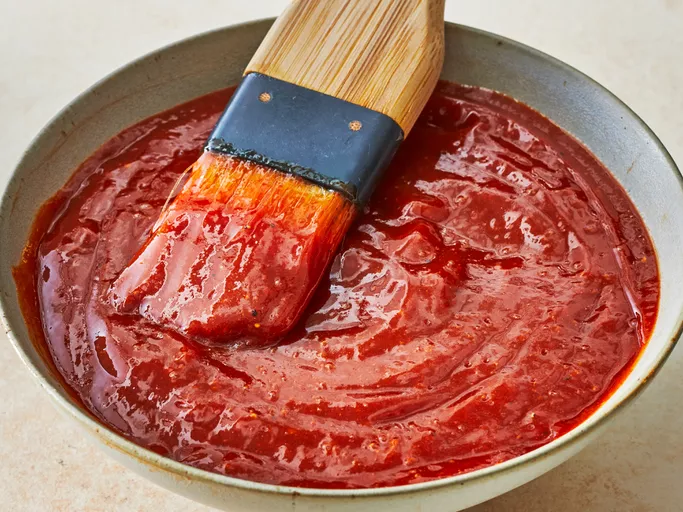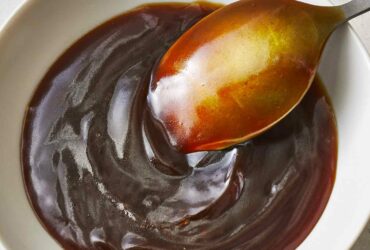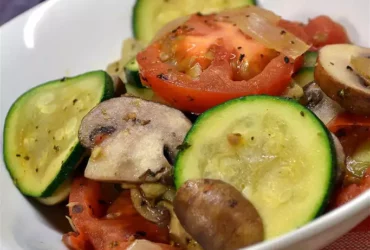Ingredients
Cooking Oil: Use a high-quality oil with a smoke point of 400°F or higher such as canola, peanut or grapeseed oil.
The choice of cooking oil for our homemade BBQ sauce recipe is an important one, as it can greatly impact the flavor and texture of the final product.
In this recipe, we will be using a high-quality oil with a smoke point of 400°F or higher, which ensures that the oil remains stable and doesn’t break down or become bitter when heated to a moderate temperature.
Some examples of suitable oils for our purposes include canola oil, peanut oil, and grapeseed oil. Canola oil has a neutral flavor and is relatively inexpensive, making it a popular choice for cooking.
Peanut oil, on the other hand, has a distinct nutty flavor that pairs well with sweet and smoky flavors often associated with BBQ sauce.
Grapeseed oil has a light and neutral flavor, but its high smoke point makes it an excellent option when working with high-heat cooking or prolonged cooking times.
It’s worth noting that some oils may have additional benefits or drawbacks for use in BBQ sauce. For example, coconut oil can impart a distinct flavor and texture to the finished product.
Avocado oil has a mild, buttery flavor and a high smoke point, making it another option to consider when choosing an oil for our recipe.
Ultimately, the choice of cooking oil will come down to personal preference and the specific characteristics you are aiming to achieve in your homemade BBQ sauce recipe.
Acidic Ingredient: Choose from apple cider vinegar, white wine vinegar, or citrus juice to add depth and brightness.
- When it comes to adding depth and brightness to your homemade BBQ sauce, acidic ingredients play a crucial role.
- The three options available for acidic ingredient addition are apple cider vinegar, white wine vinegar, or citrus juice.
- Apple cider vinegar is made from fermented apples and has a rich, fruity flavor that pairs well with sweet and smoky BBQ flavors.
- It adds a tangy, slightly sweet taste to the sauce without overpowering it, making it an excellent choice for balancing out the flavors of your BBQ sauce.
- White wine vinegar, on the other hand, is made from fermented white grapes and has a crisper, cleaner flavor compared to apple cider vinegar.
- It adds a light, refreshing taste to the sauce without overpowering its other ingredients, making it an excellent choice for those who prefer a lighter BBQ sauce.
- Citrus juice, such as lemon or lime, is another acidic ingredient option that can add brightness and depth to your BBQ sauce.
- It has a sharp, zesty flavor that cuts through the richness of other ingredients in the sauce, making it an excellent choice for those who prefer a more tangy BBQ sauce.
- No matter which acidic ingredient you choose, remember that less is often more when it comes to adding depth and brightness to your BBQ sauce.
- Start with a small amount and taste as you go, adjusting the seasoning to your liking before serving.
Purees and Spices
Ketchup: Use homemade ketchup or store-bought for a rich sweetness.
Ketchup plays a crucial role in adding depth and richness to many recipes, including this Homemade BBQ Sauce Recipe. While store-bought ketchup can be convenient, making your own homemade ketchup can elevate the flavor profile of your dish.
The key to creating a delicious homemade ketchup is to use high-quality ingredients. For instance, using ripe and flavorful tomatoes will yield a sweeter and more complex ketchup. Some recipes may also call for adding spices or aromatics like onions, garlic, or bell peppers to enhance the flavor.
When it comes to selecting the right spices for your ketchup, consider using warm spices such as cinnamon, nutmeg, and allspice to add a depth of warmth. You can also experiment with sweet spices like coriander or cardamom for added complexity.
To get the most out of your homemade ketchup, consider using a combination of sweet and hot spices. For example, adding a pinch of red pepper flakes or a dash of smoked paprika can add a smoky heat to balance out the sweetness of the tomatoes.
In addition to using high-quality ingredients and selecting the right spices, it’s also important to cook your ketchup slowly and patiently to allow the flavors to meld together. This will help to create a rich, velvety texture that coats the tongue and leaves you wanting more.
Tomato Paste: Made by reducing tomatoes and their natural sugars, use 1-2 tablespoons for added body.
In this homemade BBQ sauce recipe, we’ll be discussing the role of purees and spices, specifically tomato paste, which adds a rich and intense flavor to our BBQ sauce.
Tomato paste is made by reducing tomatoes and their natural sugars. This process concentrates the flavors, creating a thick, intense paste that’s packed with umami goodness. Using 1-2 tablespoons of tomato paste can add significant depth and body to your BBQ sauce.
Here are some tips for working with tomato paste:
- Use high-quality tomato paste: Look for a product that’s made from fresh, ripe tomatoes and has no added preservatives or sugar. This will ensure the best flavor in your BBQ sauce.
- Add it to the right place: In our homemade BBQ sauce recipe, we’ll be adding the tomato paste towards the end of cooking time. This allows the flavors to meld together without burning or overpowering the other ingredients.
- Don’t overdo it: While a little tomato paste goes a long way, too much can make your BBQ sauce taste bitter or overpowering. Start with 1 tablespoon and adjust to taste.
In addition to tomato paste, we’ll be using a blend of spices to add warmth, depth, and complexity to our BBQ sauce. Here are some common spices you might want to consider:
- Brown sugar: Adds a rich, caramel-like flavor that complements the sweetness of the tomatoes.
- Smoked paprika: Smoky, savory, and slightly sweet, smoked paprika is a great addition to BBQ sauce.
- Cumin: Warm, earthy, and slightly spicy, cumin pairs perfectly with the bold flavors of tomato paste.
- Garlic powder: Adds a subtle, savory flavor that enhances the overall depth of the sauce.
Of course, feel free to experiment and add your own favorite spices or herbs to create a unique BBQ sauce flavor. The key is to balance the flavors so they work together in harmony. With these tips and our homemade BBQ sauce recipe, you’ll be well on your way to creating a delicious, authentic BBQ sauce that’s sure to impress.
Finishing Touches
Salt and Sugar: Balance the flavor with a pinch of salt and sugar to bring out the sweetness in the ketchup and tomato paste.
The finishing touches on any homemade sauce, including our BBQ sauce recipe, can make all the difference between a decent sauce and an exceptional one. In this case, we’re focusing on balancing the flavor with a pinch of salt and sugar to bring out the sweetness in the ketchup and tomato paste.
When it comes to balancing flavors, many people focus solely on adding more ingredients or adjusting quantities without considering the impact of individual elements. However, understanding how each component contributes to the overall taste is essential for achieving harmony. Salt, in particular, plays a crucial role as it enhances the flavors of other ingredients while also providing depth and complexity.
When using salt to balance out sweet or savory notes, it’s often necessary to strike a delicate balance between enhancing the existing flavor profile without overpowering it. Using too much salt can quickly throw off the proportions, resulting in a sauce that tastes overly salty rather than balanced. It’s essential to remember that less is often more when working with salt.
On the other hand, sugar adds a distinct sweetness that helps balance out the acidity from the tomato paste and ketchup. Similar to salt, using too much sugar can quickly create an unbalanced taste experience. However, judiciously adding just enough sugar can enhance the natural sweetness in the tomatoes and elevate the overall flavor profile.
For our homemade BBQ sauce recipe, we find that a small pinch of each – about 1/4 teaspoon of salt and 1-2 pinches of granulated sugar for every cup of ketchup and tomato paste mixture – is sufficient. You can adjust these proportions to your personal taste preferences, but remember the goal is to enhance the existing flavors without overpowering them.
Remember that when working with homemade sauces, consistency is key. Make a batch at home, taste as you go, and make adjustments accordingly. Practice patience and don’t be afraid to experiment until you find the perfect balance for your taste buds. Happy cooking!
- Best Lusha Alternatives for 2025 - April 22, 2025
- Best Overloop Alternatives for 2025 - April 22, 2025
- Best 6sense Alternatives for 2025 - April 22, 2025















